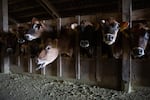Oregon environmental regulators on Wednesday unanimously rejected a petition seeking to regulate air pollution from large dairies.

Dairy cows poke their heads through fence posts at a dairy in Tillamook, Ore., Feb. 19, 2020.
Bradley W. Parks / OPB
Members of the Environmental Quality Commission said state agencies don’t have the staff or funding to support a program regulating potentially harmful pollutants tied to dairies such as ammonia, particulate matter and greenhouse gases.
Commissioners Sam Baraso, Amy Schlusser and Molly Kile all voiced concerns with dairy air pollution, but ultimately voted against the petition along with Commissioner Greg Addington.
Emily Miller, staff attorney for Food and Water Watch, said petitioners were disappointed in the decision.
“Even though they acknowledge the clear environmental and public health threat that this pollution posed … they nevertheless determined that they would not impose common-sense regulation on this virtually unregulated industry,” said Miller, lead author of the petition submitted by nearly two dozen conservation, farming and community organizations.
Petitioners sought to establish an air quality permit program that would require large dairies that exceeded emissions standards for various pollutants to find ways to cut back. They asked the state to create rules that would apply to dairies with more than 700 adult cows, which is about 47 of Oregon’s 230 dairies, according to DEQ.
The petition suggested best management practices to implement for dairies to comply with their permits like covering feed piles, storing manure in dry form, and using low-pressure sprinklers to apply liquid manure to crop fields as ways of limiting emissions.
But DEQ said it doesn’t have the resources to accurately measure current dairy emissions or quantify reductions as a result of the proposed rules.
“There are no resources at DEQ to run this program,” DEQ Interim Director Leah Feldon told commissioners, adding that it would be irresponsible of the agency to try to start one now.
DEQ received more than 1,600 comments on the petition, about 90% of which were in support of establishing air quality regulations for dairies. Air pollutants associated with dairies have documented effects on human health and the environment that supporters of the petition say need to be curbed.
But dairy farmers and their supporters pushed back on the proposed rule changes, saying that increased regulation would drive smaller operators out of business. Some said that the proposed rules were in search of an air quality problem that doesn’t exist.
Oregon Dairy Farmers Association executive director Tami Kerr said in an email Wednesday that the industry is pleased the petition was denied but understands public concerns over the climate crisis.
“No one understands this better than our Oregon dairy producers,” Kerr said. “The dairy sector is constantly adapting to the needs of our environment, making investments in technology and improving our practices.”
DEQ said in its report to the commission that it could establish an air quality permit for large dairies after a federal study is completed next fall on how to estimate emissions from concentrated animal feeding operations, or CAFOs.
The Environmental Quality Commission, DEQ’s rulemaking body, promised to reconvene on the topic of dairy air emissions in a year.
“I hope they take that commitment seriously and do the research and studies they need to start taking action here,” said Miller with Food and Water Watch. “Because this action is long overdue.”
This is not the first attempt to regulate dairy emissions in Oregon.
In 2007, the Oregon Legislature passed a bill to allow state agencies to regulate air pollution from agricultural operations and created a special task force devoted to dairy emissions.
That task force in 2008 recommended an air quality permit program similar to the one proposed by petitioners earlier this year, but it was never funded.
